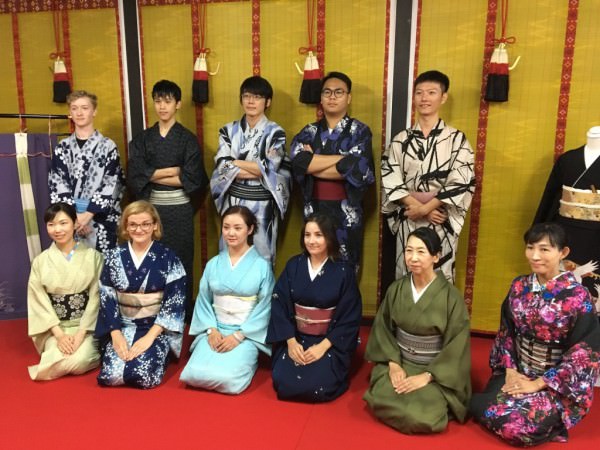Pengalaman Aplikasi Beasiswa~ Beasiswa Kementerian Pendidikan, Kebudayaan, Olahraga, Sains dan Teknologi (Mahasiswa Riset)~
2020.09.23
Petunjuk saat menulis Riset plan
Mungkin banyak diantara kita yang merasa kesulitan saat menulis riset plan, maka dari itu salam artikel ini saya akan membagikan beberapa poin yang saya rasakan. Riset plan ini nantinya akan berpengaruh besar ketika kita masuk ke tahap wawancara.
Poin 1 : Berhentilah berpikir bahwa “Saya tak akan bisa”
Dengan berpikir demikian, motivasi kita tidak akan keluar dan jadi gampang menyerah. Saya adalah orang yang cenderung berpikir demikian makanya saya sangat paham rasanya. Kalau berhenti di tahap ini kesempatan kita akan menjadi nol.
Poin 2 : Cobalah berpikir dengan kongkrit dan perlahan
Mungkin ada dari kalian yang bingung harus menulis apa. Kalau kalian kesulitan di tahap mulai menulis, mungkin lebih mudah jika kalian mulai dari menuliskan karakteristik serta kelebihan diri kalian. Pasti diantara kita semua setidaknya memiliki satu saja kelebihan diri, ataupun hal yang disukai. Misalnya saya, saya menulis bahwa “sejak kecil saya gemar sekali menggambar dan meneruskannya sampai sekarang”.
Pertama, cobalah bertanya hal yang sederhana pada diri sendiri. Misalnya, saya bertanya “siapa sih diri ini? ” “Sampai sekarang apa yang saya lakukan?”, “Saya minat terhadap apa?” dan “apa yang ingin saya pelajari lebih jauh?”. Mungkin akan sulit bagi yang pertama kali memikirkannya, tapi tidak perlu terburu-buru, cobalah untuk memikirkannya baik-baik ya. Lalu dalam tahap ini kita tidak perlu mengkhawatirkan tentang kurangnya pengetahuan kita. Justru karena tidak tahulah maka kita ingin tahu, makanya kita ingin belajar lagi.

Credit: Green Chameleon
Poin 3 : Ayo pikirkan tentang studi ke luar negeri dan hal-hal setelahnya
Penting untuk memikirkan poin bahwa apa yang akan kita lakukan di masa depan jika kita bisa belajar ke Jepang. Sulitnya dari poin ini adalah kita harus memikirkan tentang hal-hal yang belum kita alami, serta masa depan yang jauh setelahnya. Kemudian saya rasa akan sulit juga memikirkan setinggi apa langkah yang akan kita hadapi pada tahapan setelahnya? Karena itulah pertama mari coba pikirkan “di masa depan kita ingin jadi seperti apa? ” dan “apa yang bisa membuat kita bahagia dengan melakukannya?” Jika kita bisa menuliskan jawaban-jawaban itu serta merangkaikannya dengan hal-hal yang bisa kita kontribusikan untuk kebermanfaatan di masyarakat, saya rasa dokumen aplikasi beasiswanya akan bisa ditulis dengan baik,
Poin 4 : Jadilah konsisten
Saat menuliskan riset plan, saya merujuk pada beberapa website “Cara Menulis Riset Plan yang Baik”. Salah satu ungkapan menarik diantara yang saya temukan adalah katanya, ketika pembaca selesai membaca riset plan yang baik, dia akan mengenali penulisnya sebagai seseorang yang “sesuatu”. Dan “sesuatu” ini adalah “kelebihan” yang tertulis di poin 2 tadi.
Silakan tulis secara konkrit riset plan kalian dengan memperhatikan poin-poin di atas. Saya rasa riset plan saya sendiri masih kurang konkrit, jadi mungkin akan lebih baik jika kalian juga bisa memasukkan poin-poin di atas ketika memikirkan riset plan kalian. Adapun struktur riset plannya meliputi tema, tujuan, motivasi, hipotesis, metode penelitian, apa yang ingin diverifikasi, dan hasil yang diharapkan.

Credit: JESHOOTS
2. Tentang Ujian Tertulis
Dalam Beasiswa MEXT rekomendasi Kedubes Jepang di Thailand, ada 3 kategori. Mata Pelajaran apa yang akan diujikan berbeda-beda tergantung kategorinya. Saya memilih kategori R1A jadi hanya mengikuti ujian tertulis Bahasa Inggris. (Tiap negara kategori dan ujian mata pelajarannya berbeda-beda, jadi tolong dipastikan lagi.)
1. R1A : Ilmu Sosial dan Humaniora: Hukum, Politik, Pedagogi, Psikologi, Sosiologi, Linguistik, Sastra, Sejarah, Estetika, Musik, Seni Rupa, dll.
2. R1B : Ilmu Sosial dan Humaniora: Ekonomi, Perdagangan, Administrasi Bisnis, dll.
3. R2 : Ilmu Pengetahuan Alam: Ilmu Pengetahuan Murni, Teknik, Pertanian, Perikanan, Farmasi, Kedokteran, Kedokteran Gigi, Ekonomi Rumah Tangga, dll.
Saran saya, cobalah meninjau kembali soal-soal ujian sebelumnya dari beberapa tahun yang lalu, karena soal-soal tersebut umumnya memiliki pola yang sama. Soal ujian sebelumnya tersedia di situs web “Study in Japan” di bawah.
Study in Japan : Soal Ujian Seleksi Mahasiswa Asing Beasiswa Pemerintah Jepang(B. Jepang)
https://www.studyinjapan.go.jp/id/planning/scholarships/mext-scholarships/examination.html

Credit: Yustinus Tjiuwanda
3. Tentang Wawancara
Hanya pelamar yang lulus ujian tertuis yang akan melanjutkan ke wawancara. Katanya, yang dipilih untuk dating wawancara berkisar antara 20-25% dari seluruh pelamar. Saat itu saya diwawancarai oleh 4 orang pewawancara. Wawancaranya diadakan di Kedutaan Besar Jepang di Thailand, dan saya ingat merasa nyaman kala itu karena pewawancaranya sangat baik.
Persiapan yang diperlukan sebelum wawancara adalah mempersiapkan berbagai pertanyaan tentang diri dan riset plan kita, kemudian berlatih menjawabnya. Dengan begitu, kita akan bisa menjalani wawancara dengan percaya diri pada hari H.
Kalau soal pakaian, mungkin banyak orang bertanya-tanya apakah harus pakai setelan jas atau tidak. Jika punya setelan jas, yang terbaik adalah mengenakannya, tetapi meski bukan setelan jas, selama mengenakan pakaian yang pantas seperti kemeja, celana panjang, atau rok itu tidak apa-apa. Saya sendiri memakai kemeja putih dan celana panjang.

Credit: Hunters Race
Waktu saya dulu, sebelum masuk ke ruang wawancara, di ruang tunggu ada kertas bertuliskan “Tolong perkenalkan diri, dan jelaskan saat wawancara kegiatan apa yang sedang dijalani, hal apa yang ingin dilakukan, serta alasan ingin belajar ke Jepang”. Lakukanlah persiapan mental dengan mengingat lagi jawaban yang sudah disiapkan sampai sehari sebelumnya.
Saat memasuki ruang wawancara, ketuklah pintu dan ucapkan “Shitsureishimasu” dalam Bahasa Jepang, atau ”Excuse me”. Karena tidak ada salahnya bersikap sopan ya!
Mungkin ada yang bingung mau memperkenalkan diri dalam Bahasa Jepang atau Inggris, saat saya tanya kepada peserta wawancara yang lain, yang manapun boleh. Karena saat saya wawancara saya belum bisa Bahasa Jepang, saya hanya berkata ”Konnichiwa” dan selebihnya saya berbicara dalam Bahasa Inggris.
Terakhir, jangan lupa. Jawaban yang baik tidak harus berupa cerita besar yang akan mengubah dunia atau membuat kalian terlihat seperti orang hebat. Jawaban yang baik adalah jawaban yang ringkas dan diutarakan dari hati. Meskipun mungkin kedengarannya tidak keren, jawaban itu benar-benar berbicara tentang ingin menjadi siapa kita dan apa yang ingin kita lakukan.
Jika mendapatkan beasiswa ini, akan ada banyak kesulitan yang harus dihadapi saat belajar di luar negeri, seperti kendala bahasa dan budaya. Kalau dipikir-pikir, gunung berupa tantangan dalam seleksi beasiswa ini masihlah rendah.
Jadi, silakan merujuk pada pengalaman saya dan coba melamar beasiswa Monbukagakushou!
Saya mendukung kalian!

Credit: Ross Parmly
(Penulis:Charoenkijkajorn Possanunt, Kyoto Institute of Technology)
STUDY KYOTO「Tentang Beasiswa」(dalam 7 Bahasa)
https://www.studykyoto.jp/wp/id/study/scholarship/
STUDY KYOTO MAGAZINE「Beasiswa untuk Belajar di Jepang」(dalam 7 Bahasa)
https://www.studykyoto.jp/wp/id/magazine/2016/07/01/scholarships-in-japan/
Beasiswa Pemerintah Monbukagakushou(Bahasa Jepang)
https://www.mext.go.jp/a_menu/koutou/ryugaku/06032818.htm
Study in Japan「Beasiswa」(Bahasa Jepang dan Inggris)
https://www.studyinjapan.go.jp/id/planning/about-scholarship/











